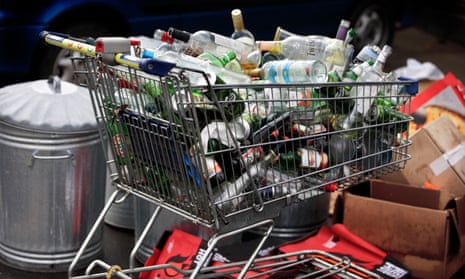The UK retail industry has warned it could cost £1bn to implement the government’s plan to charge deposits on drinks cans and bottles.
Britain’s biggest supermarkets signalled a willingness to work with the environment secretary, Michael Gove, on the scheme, which would result in consumers in England getting the deposit back if they returned the empty drinks containers to stores.
However, retailers warned there was much work to be done on how a deposit return system (DRS) would work in practice, after Gove announced the broad outline of the plan but provided little detail.
A spokesperson for Tesco said: “We support a cost-effective deposit return system and are working with a number of partners to explore how this can operate at scale. DRS is one part of the holistic approach that is needed to reduce waste and increase recycling in the UK.”
Sainsbury’s, Morrisons and Marks & Spencer said they were also open to working with the government on the proposals.
Key issues that have yet to be addressed include who would pay for the scheme, where the planned “reverse vending machines” for returning containers would be placed and whether customers would be able to return bottles and cans to any retailer, irrespective of where they bought them.
The British Retail Consortium (BRC), the trade body for UK retailers, has estimated it would cost £900m-£1bn to install machines at stores across England.
It urged ministers to work with the Scottish government, which announced plans for a DRS in September.
“We are pleased the government has said any scheme will be based on evidence and any costs for consumers and retailers will be proportionate,” said Andrew Opie, director of food and sustainability policy at the BRC.
“It is important it co-ordinates work with the Scottish government, which is further ahead with its planning. The government needs to be creative in its thinking, for example, by using municipal sites and not just shops in town centres to tackle littering.”
Gavin Partington, director general of the British Soft Drinks Association, said the industry welcomed the opportunity to contribute to the government’s consultation, which is expected to begin later this year.
However, the Society of Independent Brewers (Siba), which represents more than 800 independent craft brewers in the UK, said it was concerned that small businesses would be burdened with additional costs.
James Calder, head of public affairs at Siba, said: “Small brewers are conscious of their environmental impact and moves to encourage recycling and reduce waste and pollution are welcome.
“But Siba members, as relatively small businesses when compared to international mega brewers, are disproportionately burdened by added costs, so any deposit scheme needs to be appropriately targeted and mitigated to ensure this undue burden is minimised.”
Countries such as Germany, Sweden and Denmark operate their own versions of a deposit return scheme and have higher recycling rates than the UK.
In Britain, just 43% of the 13bn plastic bottles sold each year are recycled and 700,000 turn up as litter every day. In Germany, where a DRS was introduced in 2003, 99% of plastic bottles are recycled.
